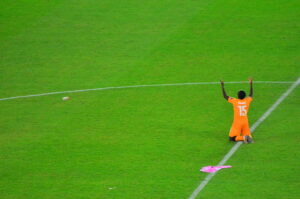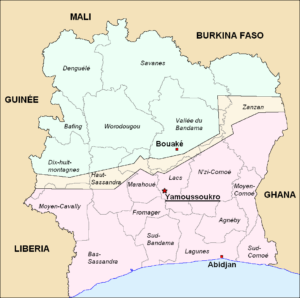A tale of two dressing rooms: Ivory Coast’s AFCON triumph marks national redemption
Seko Fofana hunches down slightly. Twenty-nine days have passed since he opened the scoring at the 2023 Africa Cup of Nations (AFCON), and he now kisses the coveted trophy as celebrations erupt in the Ivorian dressing room.
Tam Sir’s Coup du Marteau, the unofficial soundtrack to this AFCON, begins to play and the players give their rendition of the dance that has swept throughout stands at the tournament.

A very different, but equally poignant, scene played out in an Ivorian dressing room nearly two decades ago. Fractured by a brutal civil war, football gave a glimmer of hope to a despairing nation in October 2005 when The Elephants secured World Cup qualification with a 3-1 win in Omdurman, Sudan.
The particular ecstasy of this AFCON triumph is a tale of two dressing rooms.
A dressing room in Sudan
The clank of the woodwork was sweet music to Ivorian ears.
Pierre Womé hung his head in shame, hands on hips. His 96th minute penalty had cannoned out off the woodwork, condemning Cameroon to a draw with Egypt – a result that sent Ivory Coast to their first ever World Cup in place of the Indomitable Lions.
This was an Ivorian side shimmering with talent. Didier Drogba led the line, Emmanuel Eboué and Kolo Touré patrolled at the back, and a young Yaya Touré was beginning to make his mark.
It was also an Ivorian side that played with the weight of a divided nation on its shoulders. Since a failed coup in September 2002, Ivory Coast had been gripped by civil war.
A fissure emerged between the Muslim-majority rebel north and the loyalist Christian-majority south and the ensuing violence questioned the very fundaments of Ivorian identity.

In the south, President Laurent Gbagbo and the Front Populaire Ivoirien (FPI) stressed nativist identity and autochthonous rights – historical claims to land.
In the north, rebel groups amalgamated as the Forces Nouvelles de Cote d’Ivoire.
Viewing the 2000 elections as illegitimate, the rebels demanded the termination of Gbagbo’s presidency and fresh elections in its wake.
As an increasingly scarce portrait of a united Ivory Coast, the unifying potential of the football team was not to be underestimated. Potential is often unrealised, though, and it may have remained that way if not for the actions of Drogba and his teammates in a dressing room in Sudan.
Ivory Coast at the 2006 World Cup
The 3-1 win and the attendant World Cup qualification was a monumental feat, but Drogba pushed it to the margins without second thought. The Ivorian press entered the dressing room and the Chelsea forward, clasping a microphone, began his plea for peace.
“We promised you that the celebration would unite the people. Today, we beg you on our knees.”
The squad knelt.
“The one country in Africa with so many riches must not descend into war please lay down your weapons,” he pleaded.
The serious, sombre tone faded as he concluded his speech, and the sound of an Elephant’s chorus took its place.
“We want to have fun, so stop firing your guns,” the Ivorians sung.
Drogba’s speech was broadcasted widely in the weeks, months, and years that followed. It alone could not end the conflict, but it was a powerful call to action from a national hero.
A ceasefire was called in 2007, but the violence resumed in 2010 when President Gbagbo disputed the results of that year’s elections, which had gone in favour of current president Alassane Ouattara.
The violence relented when Gbagbo was forcibly ousted with United Nations backing during April 2011, but the road to rehabilitation, reintegration, and recovery has been arduous at times.
Nonetheless, just as football had played a role in shaping peace, it would act to punctuate the dawn of a new Ivory Coast.
A dressing room in Northern Abidjan
The Elephants also won AFCON in 2015, a moment that encapsulated the promise of the peacetime nation.
Special as that triumph was, nothing can compare to winning it on home soil. Few things can compare to the fairy-tale story of this AFCON either.
Ivorians may have been united in celebration on Sunday, but it was a collective grief that brought them together when a 4-0 defeat to Equatorial Guinea had put them on the brink of elimination from the group stages. And yet, just like the nation, The Elephants rose from their ruins.
Words can scarcely capture such a tantalising tale, but ‘redemption’ seems fitting on so many levels. A Moroccan flag was shown on the big screen at the Alassane Ouattara stadium after the final, acknowledging a debt to The Atlas Lions whose 1-0 victory over Zambia sent Ivory Coast through as one of the four best third-placed finishers.
They had left the group stages in disarray, firing head coach Jean-Louis Gasset and making an unsuccessful approach for Hervé Renard, before placing their fortunes in the hands of assistant coach Emerse Faé. His first assignment? Reigning champions Senegal. Redemption is never easy.
Faé made five changes to the side humiliated by Equatorial Guinea. Jean Michaël Seri, arguably the most surprising of these, would be awarded man of the match for an imperious midfield display.
But first, The Elephants had to suffer. Habib Diallo gave Senegal a fourth-minute lead, dampening the mood in the Stade Charles Konan Banny in Yamoussoukro.
The game crept into the closing stages with the hosts still trailing, but two players relegated to the bench combined to restore Ivorian hope. First, it was Nicolas Pépé bursting through and going down under Édouard Mendy’s challenge. Next, it was Franck Kessié firing home from twelve-yards.
The responsibility fell on Kessié’s shoulders once more as penalties dawned, but a composed effort gave the Ivorians a 5-4 shootout win – the redemption begins.
A dark horse Mali side awaited them in the quarter-finals, and the Ivorians returned to the brink of elimination after Nene Dorgeles’ stunning 71st minute opener. Salvation came in the form of Simon Adingra, who slid in to poke home in the 90th minute. Then, with the game seemingly destined for penalties, Oumar Diakité flicked Seko Fofana’s strike beyond Djigui Diarra in the 123rd minute.
Fofana celebrates the decisive goal in the 2-1 win
As this tale of redemption reached its zenith, a befitting hero emerged.
Emerse Faé dashed his water bottle to the ground, turned backwards and leapt into the arms of his coaching staff. The Ivorian bench surged past them, racing down the touchline to embrace Sébastien Haller.
The forward had just finished expertly to make it 2-1 in the 81st minute of the AFCON final against Nigeria, beating William Troost-Ekong to Simon Adingra’s fizzing cross.
The final whistle blew seventeen minutes later, confirming that Haller’s kick had been the decisive one.
Haller had also scored the winner against DR Congo in the semi-finals, but playing such a heroic role at this AFCON may have seemed unthinkable nineteen months ago.
In July 2022, the Borussia Dortmund star was diagnosed with testicular cancer. Two surgeries and chemotherapy followed before he returned to action in January 2023, and he marked his triumph over cancer on the football pitch the following month. Lining up against Freiburg on World Cancer Day – February 4th – Haller scored Dortmund’s third in a 5-1 rout. He pointed down to his boots in celebration, drawing our attention to the two words sewn into his Orange Puma Ultra’s: ‘F*ck Cancer.’
AFCON glory represents a resounding restatement of these sentiments for Haller, but it also marks the recovery of a nation now revelling in its convergence.
As Coup du Marteau blared in the Ivorian dressing room at the Alassane Ouattara stadium in Northern Abidjan, Drogba – who celebrated the triumph from the stands – may think back to songs sung in a dressing room in Sudan.
It will bring him great joy knowing that this Ivorian side, and this Ivorian nation, are having fun.